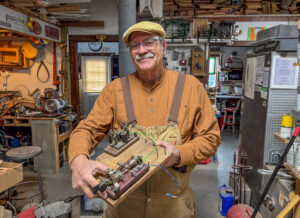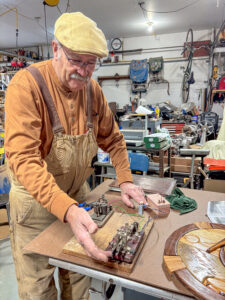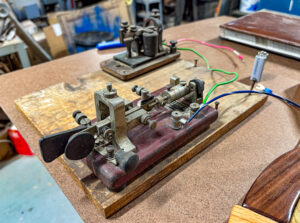Port Clinton man holds ties to his grandfather’s railroad past in Fostoria
By Sheri Trusty, Seneca County Media Relations Coordinator
William Arthur Hitchings was born in Upavon, England to a maid and an absent father in 1902, a time when unwed mothers had little support and little chance of providing a decent life for their children. With a desperate desire to give her son a better life, William’s mother walked him to a cattle boat bound for America, purchased his passage, watched him board, and walked away.

The year was 1910, William was just eight years old, and he made the long and frightening journey alone.
“His mom was a maid, and his father probably wasn’t around. She saw it as an opportunity for him,” said Williams’ grandson, Scott Hitchings of Port Clinton.

William arrived to Ellis Island, where he was processed and sent to an orphanage, which became his home for the next year. He eventually ended up in Canada, where he proved himself as an intelligent and productive young man. He was given a recommendation, written on a Masonic letterhead, that endorsed him for any work.
With that support, William was able to obtain a job as a telegraph operator for the Nickel Plate Railroad and was assigned to Fostoria, where he trained on a telegraph key, learning how to send messages to locales hundreds of miles away. William was just 18 when he began his job in Fostoria, and he remained at the job until he retired.
His mother’s heartbreaking sacrifice allowed William to create the good life she hoped for him in America, and their descendants are now enjoying the fruits of that decision. Scott retired from a successful career as a machinist, providing preventative maintenance on multimillion-dollar machinery for a Cleveland business. Now that he is retired, he spends much of his time in his large Port Clinton workshop, where he intertwines his analytical machinist’s brain with his creative skills to make intricate wood and metal artworks using vintage machines he rebuilt and enhanced with his own hands.

Displayed around those machines in his shop are a number of local artifacts, including the telegraph key his grandfather trained on in Fostoria. Currently, Scott is in the process of rebuilding the power supply case. It will look vintage and original when it is done, but for now, it supplies power to the working telegraph key, which clicks under Scott’s fingers as smoothly as it did under his grandfather’s.
In 1973, during a backpacking trip in Europe, Scott visited the house in Upavon where his grandfather was born. The homeowner invited Scott to spend the night in the home, bringing William’s unusual story full-circle.
William’s telegraph key, which was made by Standard Radio Company in the mid-1920s, is one of Scott’s favored possessions.
“I was told there are only 17 of them left,” he said. “Someone tried to buy it from me, but I said no. It has too much sentimental value.”
